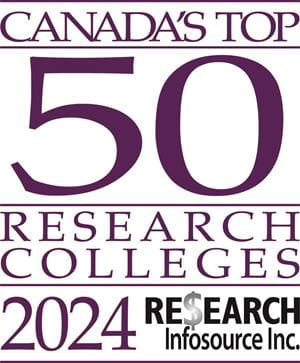
Sheridan receives high national rankings in applied research and innovation

In the 2024 edition of Research Infosource Inc.’s annual summary, Canada’s Top 50 Research Colleges, Sheridan ranks second in the categories of research partnerships and number of student researchers, while moving up to fourth in completed research projects. This is the 12th consecutive year a list has been released and reflects applied research and innovation activity from the 2022-2023 fiscal year.
Sheridan’s continued success in the Research Infosource rankings is a testament to its commitment to applied research that emphasizes collaboration, student involvement and impact. Faculty, staff and students at Generator at Sheridan collaborate with industry and community partners to deliver innovative solutions that address real-world challenges. In turn, these invaluable hands-on experiential learning opportunities equip Sheridan students to succeed in today’s competitive labour market by enhancing their technical skills and further developing their resilience and agility.
“We are proud to be a sought-after partner in applied research,” said Dr. Janet Morrison, President and Vice Chancellor at Sheridan. “These rankings demonstrate the success of our purposeful collaboration, which creates transformative learning experiences for our students while making meaningful and lasting impacts on society.”
New to the rankings this year is total granting council research income over a five-year period, a category in which Sheridan places third. This category reflects the College’s ability to secure significant government funding for research initiatives.
"Securing granting council research income is a testament to Sheridan’s national reputation for conducting high-quality research that addresses critical societal and industry needs,” said Dr. Vicki Mowat, Dean of Research at Sheridan. “This funding fuels our work and our ability to drive progress and enhance Canada's competitiveness.”
Recent research project highlights include:
Enhancing prosthetic comfort for amputees
 With nearly half of lower-limb prosthetics abandoned due to inadequate fittings, the Centre for Intelligent Manufacturing and industry partner ProsFit explored innovative ways of improving prosthetic fitting and comfort for lower-limb amputees.
With nearly half of lower-limb prosthetics abandoned due to inadequate fittings, the Centre for Intelligent Manufacturing and industry partner ProsFit explored innovative ways of improving prosthetic fitting and comfort for lower-limb amputees.
By testing and programming a robotic gait simulator to mimic human movement patterns, the Centre’s research team of faculty, staff and students gathered data that assessed different factors like weight, height and angles that can affect comfort for the prosthetic user.
Ongoing work continues with ProsFit to enhance the prosthetic design and fit.
A personalized intervention for individuals living with dementia
.jpeg?h=auto&w=800&rev=42c13ac7a6fa45bfa799ce1b5c0f72b8&hash=FF3CBC9F2EA472C73B45C8B7EF63A944) The Centre for Elder Research and LUCID, a Toronto-based developer of music-based machine learning therapeutics for mental health, explored how music experiences can help improve the health and well-being of individuals living with dementia.
The Centre for Elder Research and LUCID, a Toronto-based developer of music-based machine learning therapeutics for mental health, explored how music experiences can help improve the health and well-being of individuals living with dementia.
The research helped refine LUCID’s Affective Music Recommendation System, an AI-powered tool that personalizes music to support individuals with dementia and their care teams, by gathering user feedback and training data to help drive their personalization features.
The patent-pending invention is currently being piloted in a home-based trial.
Predictive insights into osteoporotic fractures
 Osteoporosis continues to be a major cause of fractures, especially in postmenopausal women and older men. Existing screening tools for osteoporosis evaluate fracture risk within a 10-year window, which might not be suitable for evaluating shorter-term risk.
Osteoporosis continues to be a major cause of fractures, especially in postmenopausal women and older men. Existing screening tools for osteoporosis evaluate fracture risk within a 10-year window, which might not be suitable for evaluating shorter-term risk.
Faculty of Applied Science and Technology professor Dr. Volodymyr Voytenko and the Centre for Applied AI are collaborating with Oakville-based data-driven software solutions provider Naryant and Osteoporosis Canada on research using machine learning and algorithms to develop an AI-driven automated pre-screening tool for osteoporosis risk, identifying those likely to experience fractures.
The team has secured further funding for the next phase of development to enhance the tool’s predictive capabilities.
About Generator at Sheridan
Generator at Sheridan is where purpose and passion unite the extraordinary research, innovation and entrepreneurship undertaken by Sheridan’s faculty, staff and students, working across disciplines and sectors, to drive meaningful impact for an everchanging world. For more information, visit sheridancollege.ca/generator.
About Research Infosource
Research Infosource is widely acknowledged as a respected and leading source of ranking information on research universities, hospitals, colleges, and companies that are used and followed by the research and innovation community, opinion and policy leaders in the government, research, corporate, higher education and non-profit sectors.
Media Contact
For media inquiries, contact Sheridan’s Communications and Public Relations team.
